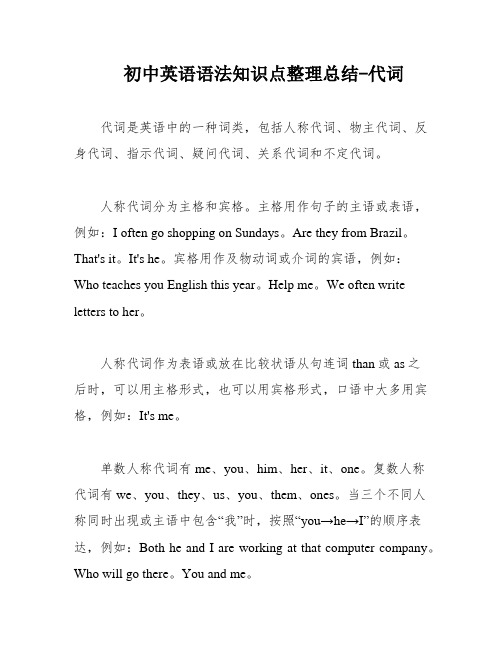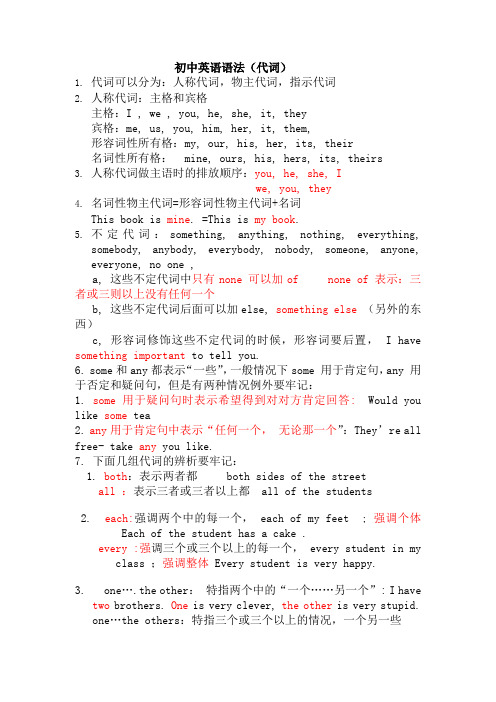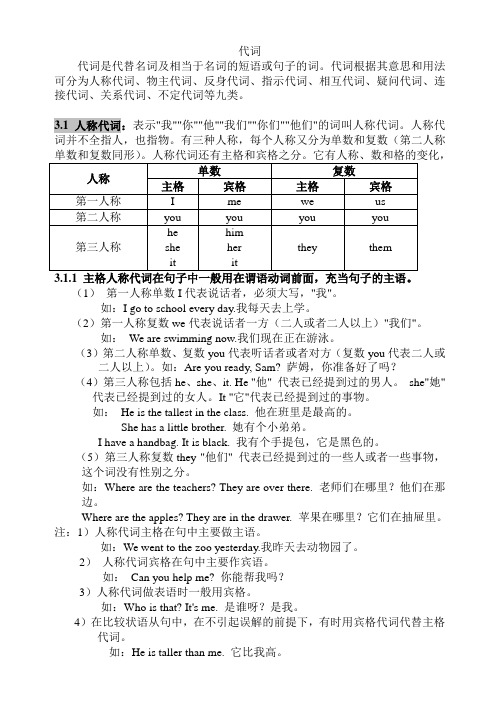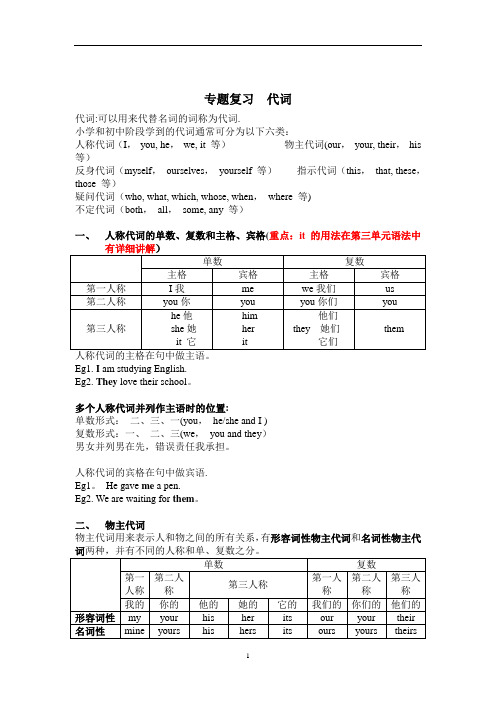初中英语语法-代词
初中英语语法总结-代词(共15张PPT)

功能 形容词性物 作主语 主代词 名词性物主 作主语 代词 作宾语 作表语 与of连用 作定语 例句 Her father is a doctor. This is her pen. Mine is broken. Her spoken English is better than mine. That pencil is hers. The blue coat of his is very beautiful. 备注 形容词性物主代词作定语 相当于形容词 名词性物主代词在句中不 能单独作定语。如: Yours English is better than hers Your English is better than hers.
none
指代人或物 可与of连用, 谓语动词用单复数均可 回答how many/much的提问
—Sorry, we’ve got none left.对不起,一张也没有了。
—Who is absent from classes today? 今天谁没有来上课? —No one, sir.没人缺席,先生。 —Tickets for Friday?星期五的票(还有吗)? None of them is/are in the classroom. 他们当中没有一个在教室里。
Tips: 1)排列顺序: 单数:二、三、一; You, he and I are all 复数:一、二、三; We, you and they are students. 2)第一人称单数代词I , 无论 在什么地方出现都要大写。
作形式主语、形式 宾语
指前文提到的物 指不知性别的婴儿 或不确定性别的人
词条 each every 每个(强调个体) 每个(整体描述) 用法 作主语、宾语、定语、同位语 两者或两者以上 只能作定语 三者或三者以上 可与of搭配 不可与of搭配
初中英语语法知识点整理总结-代词

初中英语语法知识点整理总结-代词代词是英语中的一种词类,包括人称代词、物主代词、反身代词、指示代词、疑问代词、关系代词和不定代词。
人称代词分为主格和宾格。
主格用作句子的主语或表语,例如:I often go shopping on Sundays。
Are they from Brazil。
That's it。
It's he。
宾格用作及物动词或介词的宾语,例如:Who teaches you English this year。
Help me。
We often write letters to her。
人称代词作为表语或放在比较状语从句连词than或as之后时,可以用主格形式,也可以用宾格形式,口语中大多用宾格,例如:It's me。
单数人称代词有me、you、him、her、it、one。
复数人称代词有we、you、they、us、you、them、ones。
当三个不同人称同时出现或主语中包含“我”时,按照“you→he→I”的顺序表达,例如:Both he and I are working at that computer company。
Who will go there。
You and me。
人称代词it除了可以指人指物之外,还可以表示“时间、天气、温度、距离、情况”等含义,此外还可以作为“非人称代词”使用,替代作主语或宾语的不定式、动名词或名词性从句,例如:What's the weather like today。
It's fine。
What's the time。
It's 12:00.为反身代词的作用是强调动作的执行者与承受者是同一人或同一事物。
反身代词通常位于动词或介词后面。
如:I XXX XXX XXX(我在打篮球时弄伤了自己。
)He always talks to himself when he is alone。
(他独自一人时总是自言自语。
初中英语语法(代词)

初中英语语法(代词)1.代词可以分为:人称代词,物主代词,指示代词2.人称代词:主格和宾格主格:I , we , you, he, she, it, they宾格:me, us, you, him, her, it, them,形容词性所有格:my, our, his, her, its, their名词性所有格: mine, ours, his, hers, its, theirs3.人称代词做主语时的排放顺序:you, he, she, Iwe, you, they4.名词性物主代词=形容词性物主代词+名词This book is mine. =This is my book.5.不定代词:something, anything, nothing, everything,somebody, anybody, everybody, nobody, someone, anyone, everyone, no one ,a, 这些不定代词中只有none 可以加of none of 表示:三者或三则以上没有任何一个b, 这些不定代词后面可以加else, something else (另外的东西)c, 形容词修饰这些不定代词的时候,形容词要后置, I have something important to tell you.6. some和any都表示“一些”,一般情况下some 用于肯定句,any 用于否定和疑问句,但是有两种情况例外要牢记:1. some用于疑问句时表示希望得到对对方肯定回答: Would you like some tea2.any用于肯定句中表示“任何一个,无论那一个”:They’re all free- take any you like.7. 下面几组代词的辨析要牢记:1. both:表示两者都 both sides of the streetall :表示三者或三者以上都 all of the students2. each:强调两个中的每一个, each of my feet ; 强调个体Each of the student has a cake .every :强调三个或三个以上的每一个, every student in my class ;强调整体Every student is very happy.3. one….the other:特指两个中的“一个……另一个”: I havetwo brothers. One is very clever, the other is very stupid.one…the others:特指三个或三个以上的情况,一个另一些There are four boys in the classroom. One is reading. The others are talking.one…the other +名词:特指三个或三个以上的情况,一个另一些There are four boys in the classroom. One is reading. The other boys are talking.4. some…the others:/some…others 在一个特定的范围内,“一些……,别的一些”The students are busy with the experiment. Some are operating the machine. The others are recording the results.5. one…another…the other/one…another…the third :表示列举三个人或三样事物The old woman has three daughters.One is in China.Another is in America. The other is in France.6.each other:表示两者中的相互After the tennis match, the two players shook hands with each other.one another:表示三者,三者以上的相互After the football match, all the players shook hands with one another.。
初中英语语法-代词

代词代词是代替名词及相当于名词的短语或句子的词。
代词根据其意思和用法可分为人称代词、物主代词、反身代词、指示代词、相互代词、疑问代词、连接代词、关系代词、不定代词等九类。
3.1 人称代词:表示"我""你""他""我们""你们""他们"的词叫人称代词。
人称代词并不全指人,也指物。
有三种人称,每个人称又分为单数和复数(第二人称(1)第一人称单数I代表说话者,必须大写,"我"。
如:I go to school every day.我每天去上学。
(2)第一人称复数we代表说话者一方(二人或者二人以上)"我们"。
如:We are swimming now.我们现在正在游泳。
(3)第二人称单数、复数you代表听话者或者对方(复数you代表二人或二人以上)。
如:Are you ready, Sam? 萨姆,你准备好了吗?(4)第三人称包括he、she、it. He "他" 代表已经提到过的男人。
she"她"代表已经提到过的女人。
It "它"代表已经提到过的事物。
如:He is the tallest in the class. 他在班里是最高的。
She has a little brother. 她有个小弟弟。
I have a handbag. It is black. 我有个手提包,它是黑色的。
(5)第三人称复数they "他们" 代表已经提到过的一些人或者一些事物,这个词没有性别之分。
如:Where are the teachers? They are over there. 老师们在哪里?他们在那边。
Where are the apples? They are in the drawer. 苹果在哪里?它们在抽屉里。
初中英语语法---代词专题(含练习)

专题复习代词代词:可以用来代替名词的词称为代词.小学和初中阶段学到的代词通常可分为以下六类:人称代词(I,you, he,we, it 等)物主代词(our,your, their,his 等)反身代词(myself,ourselves,yourself 等)指示代词(this,that, these,those 等)疑问代词(who, what, which, whose, when,where 等)不定代词(both,all,some, any 等)一、人称代词的单数、复数和主格、宾格(重点:it的用法在第三单元语法中Eg1. I am studying English.Eg2. They love their school。
多个人称代词并列作主语时的位置:单数形式:二、三、一(you,he/she and I )复数形式:一、二、三(we,you and they)男女并列男在先,错误责任我承担。
人称代词的宾格在句中做宾语.Eg1。
He gave me a pen.Eg2. We are waiting for them。
二、物主代词物主代词用来表示人和物之间的所有关系,有形容词性物主代词和名词性物主代形容词性物主代词不能单独使用,只做定语,用来修饰其后的名词。
Eg1。
My parents are both doctors.Eg2。
There’s something wrong with his bike.名词性物主代词应独立使用,后面不跟名词,相当于形容词性物主代词+名词,在句中可以作主语、宾语或标语.Eg1. Our classroom is on the second floor,and theirs is on the fourth floor. (作主语) Eg2。
Let's clean their room first, and then clean ours. (作宾语)Eg3。
初中英语语法大全——代词(共34张PPT)

C. 用来指代婴儿和不知身份,性别的人 Who is dancing in the classroom? It must be Lily. The baby is cr ying. It might be hungr y. D. 做形式主语或形式宾语 it可以代替不定式,动名词,从句等做形式主语或形式宾语, 而把真正的主语和宾语置于句末。 It's hard work keeping the grass green at this time of year. Did you find it very interesting to play volleyball?
4. either,neither
(1) either表示“两者中的任何一个”,做主语时,谓语动词常用单 数形式,起其后可接of短语。 You can come on Saturday or Sunday. Either is OK for me. We can't care much for what to eat. Either of the two will do. (2) neither 表示“两者都不”,做主语时,谓语动词常用单数形式, 其后可接of短语。 We have red and yellow T-shirts. Which color do you like? Oh, neither. I think blue will be OK. Neither of them wants to speak to him about this matter.
2. that和those作替代词的用法
为了避免重复,that可指代前面提到的单数可数名词 和不可数名词,those可代替复数可数可数名词,其 后总有修饰。
In summer in Beijing is cooler than that in Shanghai.
初中英语语法-代词

初中英语语法——代词一.代词的分类人称代词物主代词反身代词不定代词指示代词疑问代词人称代词:They all like him very much.他们都很喜欢他。
She gave the books to you and me.这些书是她送给你和我的。
2. 人称代词在作表语时,用宾格——Who’s knocking at the door?——It’s me.谁敲门?-是我。
3. 人称代词在并列使用时的顺序为“第二人称,第三人称,第一人称”You, she and I all enjoy the music.你我她都喜欢音乐。
4. she可以用来代表国家、船只、大地、月亮等We love our motherland, we hope she’ll be stronger and bigger.我们热爱我们的祖国,我们希望她更强大。
The ship is leaving. She’s on her first trip to Boston.轮船要起航了。
这是她第一次去波士顿。
5. it作为人称代词时,可以表示天气、距离、时间、环境等——What’the weather like today?——It’s windy.今天的天气怎么样?- 有风。
It’s about five minutes’walk from home to school.从家到学校的路程大约5分钟。
6. it可作为形式主语,将不定式、动名词等构成的主语后移,使句子显得平稳It’s hard to reach the apples.很难够到苹果。
It’s good for you taking a walk after supper.对你来说饭后散步是有好处的。
物主代词形容词性名词性my mineyour yourshis hisher hersits itsour oursyour yourstheir theirs1. 形容词性物主代词在句中只能作定语My brother is a worker.我弟弟是个工人。
初中英语语法代词讲解

初中英语语法代词讲解Newly compiled on November 23, 2020初中英语语法代词代词:为了避免重复而用来代替其他词的词。
种类:1) 人称 2) 物主 3) 反身4) 指示 5)不定6) 疑问7) 相互代词:each other, one another互相,其所有格加-’s8) 关系代词:which, who,that,whom,whose等引导定语从句9) 连接代词:who, whom, whose, what, which, whatever, whichever, whoever, whomever10)替代词:one(单数), ones(复数)用于替代前面出现的同类事物。
但ones必须和形容词连用。
如果替代的名词时无形容词在前,则用some, any,而不用ones。
如:Have you bought any rulers Yes,I 've bought some.一、人称代词1.人称代词的形式2.人称代词的句法功能3.人称代词的排列顺序(单数231,复数123)当两个以上的人称代词一起作主语时,单数按二、三、一人称排列(即you, he / she, I);复数按一、二、三人称排列(即we, you, they)。
但是如果做错了事需要承担责任时,要把说话人(I)放在第一位。
如:It was I and John that made her angry. 是我和约翰惹她生气了。
二、物主代词1.物主代词的形式2.物主代词的基本用法3.物主代词的特殊用法在双重所有格中只能用名词性物主代词。
如:我的一个朋友a friend of mine ,她的一个同学 a classmate of hers , each brother of his.三、反身代词1.反身代词的形式反身代词又叫自身代词,表示动作返回到动作发出者本身。
2.反身代词的句法功能3.由反身代词构成的习惯用语①help oneself to 随便吃……②come to oneself 苏醒过来,醒悟,恢复知觉③dress oneself 自己穿衣服④say to oneself 自言自语⑤enjoy oneself 玩得开心⑥lose oneself in迷路于,全神贯注于…之中,消失于⑦teach oneself 自学⑧look after oneself ⑨by oneself 亲自learn……by oneself 自学…leave one by oneself 把某人单独留下hurt oneself 伤了自己make yourself/yourselves at home 不必拘束四、指示代词1. that 用来代替前面提到的不可数名词,those代替复数名词。
- 1、下载文档前请自行甄别文档内容的完整性,平台不提供额外的编辑、内容补充、找答案等附加服务。
- 2、"仅部分预览"的文档,不可在线预览部分如存在完整性等问题,可反馈申请退款(可完整预览的文档不适用该条件!)。
- 3、如文档侵犯您的权益,请联系客服反馈,我们会尽快为您处理(人工客服工作时间:9:00-18:30)。
初中英语语法——代词一.代词的分类人称代词物主代词反身代词不定代词指示代词疑问代词人称代词:人称代词代替人和事物的名称,分为主格和宾格两种形式。
第一人称单数第二人称单数第三人称单数第一人称复数第二人称复数第三人称复数阳性阴性中性主格I(我)you(你)he(他)she(她)it(它)we(我们)you(你们)they(他们,她们,它们)宾格me(我)You(你)him(他)her(她)it(她)us(我们)you(你们)them(他们,她们,它们)1.人称代词作主语时用主格,作宾语时用宾格They all like him very much.他们都很喜欢他。
She gave the books to you and me.这些书是她送给你和我的。
2.人称代词在作表语时,用宾格——Who’s knocking at the door?——It’s me.谁敲门?-是我。
3. 人称代词在并列使用时的顺序为“第二人称,第三人称,第一人称”You, she and I all enjoy the music.你我她都喜欢音乐。
4.she可以用来代表国家、船只、大地、月亮等We love our motherland, we hope she’ll be stronger and bigger.我们热爱我们的祖国,我们希望她更强大。
The ship is leaving. She’s on her first trip to Boston.轮船要起航了。
这是她第一次去波士顿。
5.it作为人称代词时,可以表示天气、距离、时间、环境等——What’the weather like today?——It’s windy.今天的天气怎么样?- 有风。
It’s about five minutes’walk from home to school.从家到学校的路程大约5分钟。
6.it可作为形式主语,将不定式、动名词等构成的主语后移,使句子显得平稳It’s hard to reach the apples.很难够到苹果。
It’s good for you taking a walk after supper.对你来说饭后散步是有好处的。
物主代词形容词性名词性my mineyour yourshis hisher hersits itsour oursyour yourstheir theirs1.形容词性物主代词在句中只能作定语My brother is a worker.我弟弟是个工人。
His parents are very friendly.他的父母非常友善。
3.形容词性物主代词和名词性物主代词的关系:形容词性物主代词+名词=名词性物主代词注意:名词性物主代词在句中所指代的关系是单数还是复数。
These books aren't ours. Ours are new.(our books = ours)This is not our room. Ours is over there.(our room = ours)4.“of +名词性物主代词”表示所属A sister of his is a nurse.他的一个妹妹是个护士。
Tom is a friend of mine我的一个朋友反身代词单数myself yourself himself herself itself复数ourselves yourselves themselves1.反身代词在句中可以作宾语、表语和同位语He thinks more of others than of himself.他想到别人比想到自己更多一些。
That poor boy was myself.那个可怜的孩子就是我自己。
He himself was a doctor.他本人就是一个大夫。
I myself can work the problem out.我能亲自算出这道题2.反身代词有以下常见搭配enjoy oneself = have a good timeby oneself = alonehelp oneself to…learn sth. by oneself =teach oneself sth.注意:oneself 有单复数之分* I enjoy myself.* Children, help yourselves to some fish.不定代词不是指明代替特定名词(或形容词)的代词all, each, every, both, either, neithernone, one, little, few, many, muchother, another, some, any, no由some, any, no, every 等构成的合成代词几组在用法上容易混淆的不定代词1.some/anysome(一些,某)一般用于肯定句中There are some flowers in front of the house.any(一些,任何)多用于疑问句和否定句Do you have any picture-books?注意:some有时也可用于表示请求、征求意见的疑问句中Would you like some meat?你想要些肉吗?May I ask some questions?我可以问问题吗?Could I have some apples?我可以吃苹果吗?Will you give me some water?你能给我些水吗?2. many/muchmany修饰或指代复数名词There are many eggs in the basket.Many of us like playing games.much 修饰或指代不可数名词He doesn’t know much English.3.another/otheranother 泛指三个或三个以上中的另一个I don’t want this coat. Please show me another.other 后面接名词,泛指别的、其他的Do you have any other questions?4. the other/others/the others / the other1. 特指两个中的另一个He has two sons. One is a worker, the other is a doctor.2. 修饰名词,特指另一个、另一些Tom likes swimming, and the other boys in his class like swimming, too.others泛指其他的人或物He often helps others.Some are playing basketball, others are playing football.the others 特指确定范围内剩下的全部人或物There are fifty students in our class. Twenty of them are girls, the others are boys.5.few/a few/little/a littlefew/a few 修饰可数名词little/a little 修饰不可数名词few, little 表示否定意义, 译为“没有几个”,“没有多少”a few, a little 表示肯定意义, 译为“有几个”,“有一点”6.every/eachevery+单数名词,表示“每一个”,强调共性、整体,只作定语,形式上为单数.不与of 连用Every child likes playing games.each 表示“每一个”,强调个性,作定语主语、宾语和同位语,常与of 连用Each student was asked to try again.Each of them has a nice skirt.7.all/noneall “(全部)都”,表示三者或三者以上,作同位语时,一般放在连系动词、助动词之后,行为动词之前。
We are all from Canada.They all like English.none “没有”,表示三者或三者以上都不,后常跟介词of(谓语动词单、复数均可)None of us is/are afraid of dogs.8.both/either/neitherboth “(两者)都”,作主语时看作复数;作定语时后跟名词复数My parents are both teachers.=Both of my parents are teachers.neither “(两者)都不”,含有否定意义,作主语时谓语用第三人称单数; 作定语时后跟名词单数Neither answer is right.either “两者中任何一个”,作主语时谓语用第三人称单数; 作定语时后跟名词单数There are trees on either side of the street.= There are trees on both sides of the street.有关词组及应用both of/either of/neither ofBoth of them swim well.他们俩都游得很好。
Either of you goes to Beijing.你们俩随便谁去北京都可以。
Neither of them stopped to have a rest.他们俩谁都不停下来休息。
both…and(谓语动词用复数形式)either…or/neither…nor(谓语动词遵循就近原则)Both Tom and Lucy are in Grade Two.Tom 和Lucy 都在二年级。
Either my father or my mother cooks at home.或者我爸爸或者我妈妈在家烧饭。
Neither he nor I am free today.我和他今天都没空。
9.Something/anything/nothingSomebody/anybody/nobody当形容词修饰这些不定代词时,常后置I have something important to tell you.Is there anything else in the box?Nobody can answer the question.指示代词表示空间和时间远近关系的代词包括:this/that (单数) these/those (复数) 1. this,these指在方位上较近的人或物that,those指在方位上较远的人或物This is my shirt, that’s yours.These TVs are made in China, those are made in Japan.2.that,those常指前面提过的东西,以免重复*These boxes are heavier than those on the desk.3.刚才提到的事情,在英文中用that*He was ill yesterday. I’m sorry to hear that.疑问代词用来构成特殊疑问句的代词常见有:who whom whose what which 通常做主语\宾语\定语\表语What makes you think like that ? \做主语\Who (Whom) were you talking with? \做宾语\Which bus do I need? \做定语\What’s your father? \做表语\注意:在口语中,Who和Whom通用,但在介词后只能用WhomWith whom did he play games?With who did he play games?(错)。
